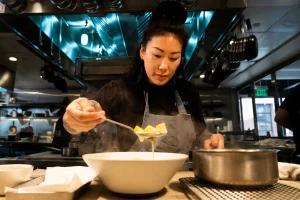As I wrote recently in this blog, for those from mixed ethnic backgrounds, one avenue to reclaim what feels like a lost heritage from one of the parents is to learn that parent’s language. The feeling that one does not fit into a personally linked ethnic group has sometimes been labeled racial imposter syndrome. It’s the sense that some individuals may have that their lives are in a sense inauthentic because they don’t conform to key aspects of the ethnic heritage with which they identify.
A current piece in the New York Times describes a different way to connect with that less dominant side of ones family cultural heritage, namely through food. The article, “Food Is Identity. For Korean Chefs Who Were Adopted, It’s Complicated”, explores how adoptees in the US from Korea (a large group) have learned to cook Korean food, with some becoming professional chefs. The situation is described as “complicated” for several reasons. The cooks have grown up in non-Korean environments and often have had little exposure to Korean cuisine until later in life. They tend not to cook straight traditional Korean dishes, but rather integrate Korean cooking techniques and ingredients into many dishes they prepare. One woman in the article, Katianna Hong, is described as “a Korean woman adopted and raised by a German Jewish father and an Irish Catholic mother.” She makes matzo ball soup, a traditional Jewish food, in an unconventional way:
Instead of the mirepoix of carrots, celery and onions her grandmother called for, Mrs. Hong opts for what she calls “Korean mirepoix” — potatoes and hobak, a sweet Korean squash — cooked slowly in chicken fat until translucent. She dribbles a spoonful of the mixture around a hulking matzo ball surrounded by swollen sujebi, the hand-torn Korean noodles, all floating in a bowl of chicken broth as creamy and cloudy as the ox bone soup Seolleongtang.
The article describes the soup as “a tribute to her adoptive family’s background and her own heritage”. While for the adoptees, the experience of cooking Korean may bring personal fulfillment, the chefs may face backlash from other Korean Americans that their cooking isn’t Korean enough. Here again, the situation is complicated. Kim Park Nelson, an associate professor of ethnic studies at Winona State University, herself a Korean adoptee is quoted in the article on the complexity involved:
The most common example I hear, and what I have experienced, is being asked if I like kimchi. I do, but not all adoptees are crazy about kimchi. There is almost a nationalistic connection between kimchi and Korea. It’s like a test question: Are you actually Korean?
Adoptees learn to cook Korean from different sources, but often from social media such as YouTube. The experience of starting to make Korean food can prove to be emotional: “For a Korean adoptee, eating Korean food can be a reminder of the loss, grief and disconnection they’ve experienced. Cooking may intensify those feelings.” It may be scray to assert ones identity as “Korean” if one has not grown up eating Korean food:
Feelings of self-doubt — the impostor syndrome — can turn into fears of cultural appropriation. Many adoptee chefs say they feel like outsiders looking in, wondering not only if they have permission to cook the cuisine of their heritage, but also if what they’re doing could taint it.
As one Korean adoptee chef stated in the piece: “In some ways, Korean food becomes a marker of what you aren’t.”
